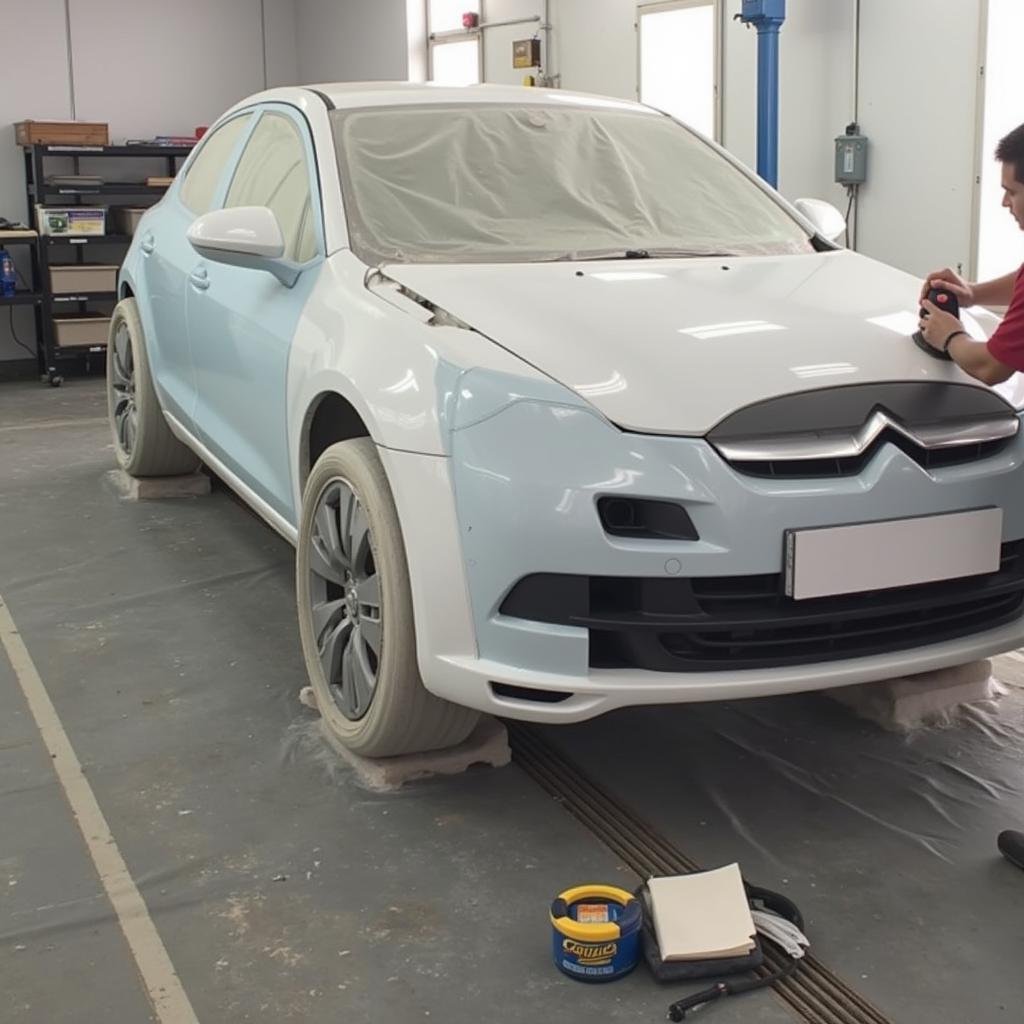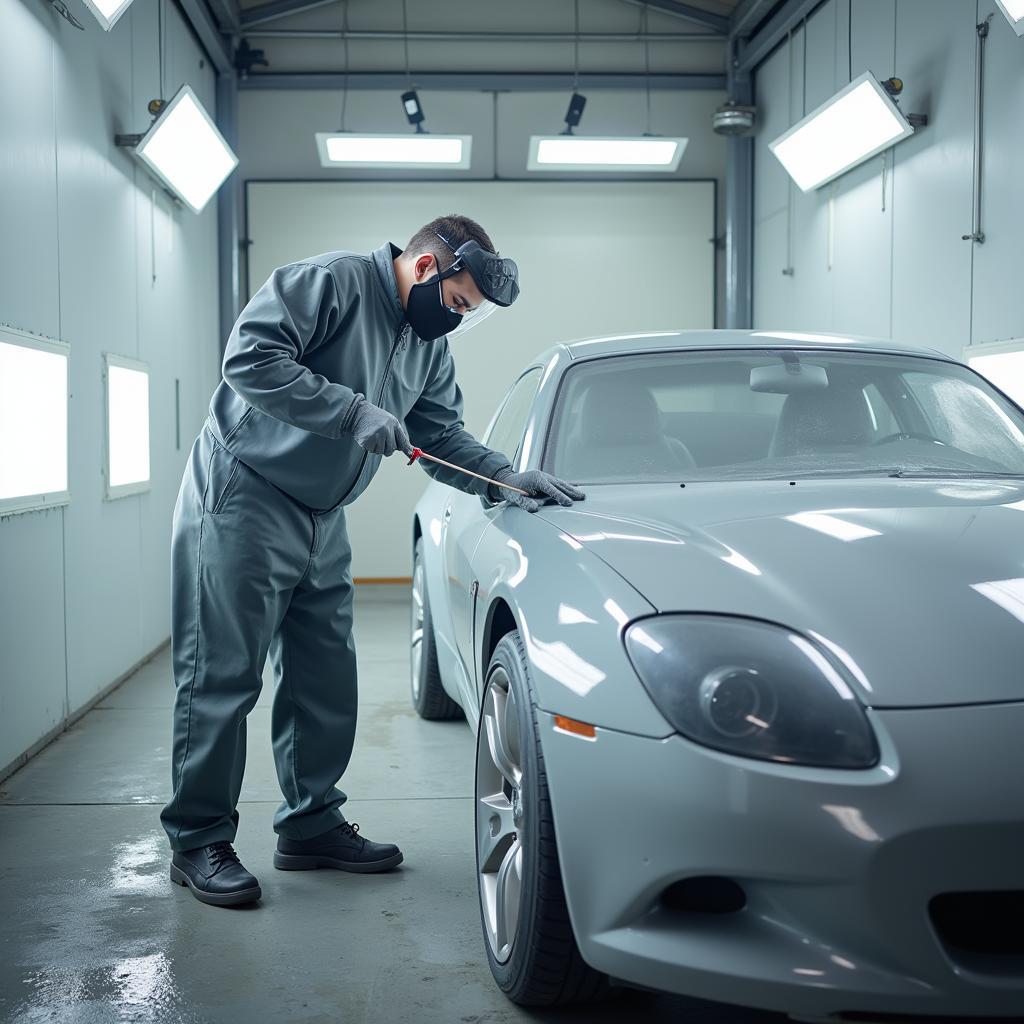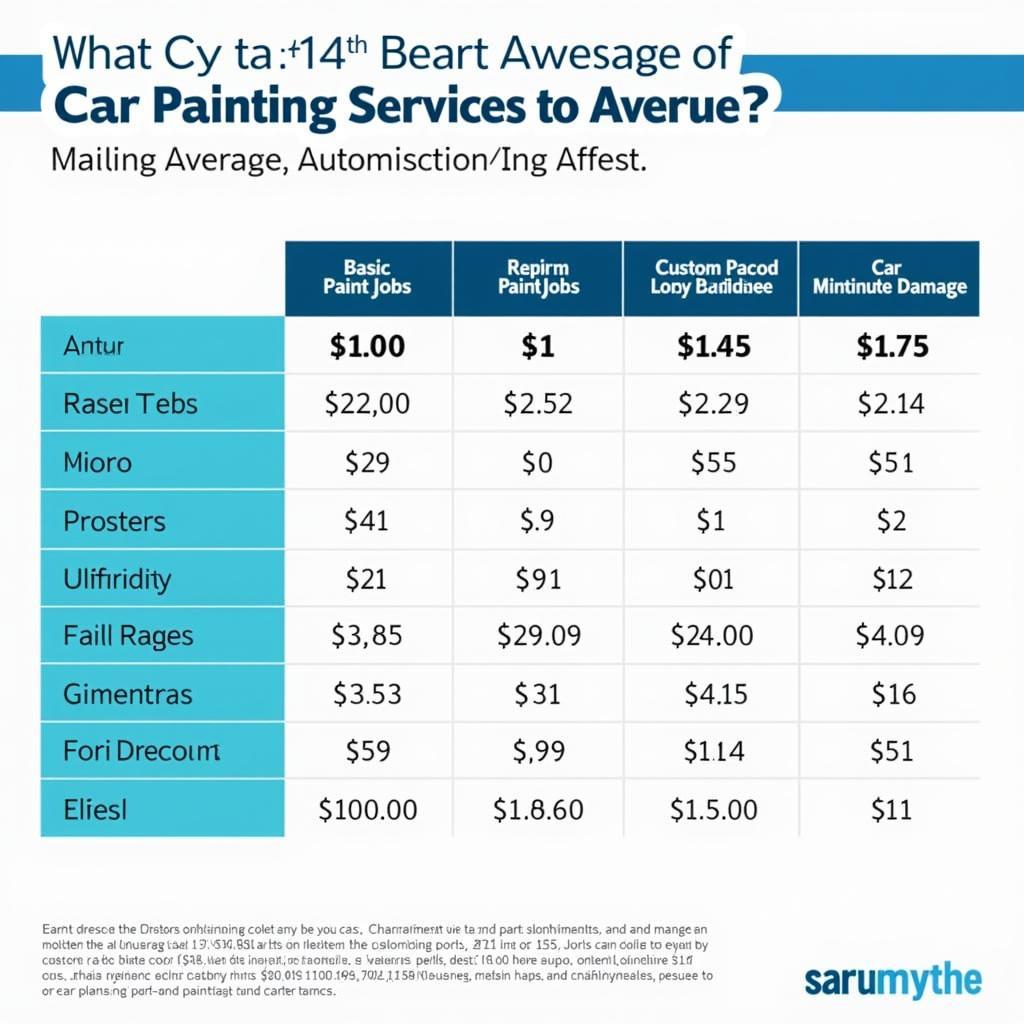Car painting is more than just a cosmetic enhancement; it’s a crucial aspect of vehicle maintenance and restoration. Whether you’re looking to repair damage, refresh your car’s appearance, or give it a whole new look, understanding the car painting process is essential. From choosing the right paint type to finding a qualified professional, this guide covers everything you need to know about achieving a flawless finish.
Types of Car Paint
Choosing the right car paint is the first step towards a successful paint job. There are various types of car paint available, each with its own pros and cons. Understanding the differences will help you make an informed decision based on your budget, desired finish, and the level of durability you require.
- Acrylic Lacquer: This type of paint is known for its quick drying time and ease of application. It provides a glossy finish and is relatively affordable. However, it is less durable and prone to chipping and fading compared to other options.
- Acrylic Enamel: Offering a balance between cost and durability, acrylic enamel provides a hard, glossy finish and is more resistant to weathering than lacquer. It’s a popular choice for DIY car painting projects.
- Urethane: Urethane paints are known for their superior durability and resistance to chemicals, chipping, and UV rays. They offer a high-gloss finish and are ideal for vehicles exposed to harsh environments.
- Water-Based Paint: Environmentally friendly and easy to clean up, water-based paints are becoming increasingly popular. They offer good durability and color retention but can require more coats for optimal coverage.
After washing your car, do you look at your car’s paint job and cringe? Maybe it’s time for a new colour painting car.
The Car Painting Process: A Step-by-Step Guide
The car painting process involves several crucial steps that, when followed correctly, guarantee a professional and long-lasting finish. From the initial preparation to the final clear coat, each stage plays a vital role in achieving a flawless result.
- Preparation: This is the most critical step. It involves cleaning the car thoroughly, removing any rust or imperfections, and sanding the surface to create a smooth base for the paint to adhere to.
- Priming: Primer provides a uniform surface for the paint and helps to prevent rust.
- Base Coat Application: This is where the color of your car comes to life. Multiple thin coats are applied to achieve even coverage and a rich, vibrant color.
- Clear Coat Application: The clear coat protects the base coat from UV rays, scratches, and environmental damage, while also enhancing the shine and depth of the color.
- Buffing and Polishing: This final step removes any imperfections and creates a smooth, glossy finish.
 Car Painting Preparation Process
Car Painting Preparation Process
Choosing the Right Professional for Your Car Painting Needs
While some car owners opt for DIY car painting, hiring a professional often yields better results, especially for complex repairs or custom paint jobs. Finding a reputable and skilled professional is crucial for a high-quality, long-lasting finish.
- Experience and Expertise: Look for a painter with a proven track record and experience with different types of car paint.
- Reviews and Testimonials: Check online reviews and testimonials to get an idea of the quality of their work and customer service.
- Portfolio: Ask to see examples of their previous work to assess their skills and attention to detail.
- Warranty: A reputable painter should offer a warranty on their work.
 Professional Car Painter Applying Base Coat
Professional Car Painter Applying Base Coat
A new paint job can drastically change the appearance of your car. Check out the latest car prices to see how a fresh coat of paint can increase your car’s value. Maybe you also enjoy working with car model kit and can practice your painting skills on a smaller scale.
How Much Does Car Painting Cost?
The cost of car painting varies depending on several factors, including the size of the vehicle, the type of paint used, the extent of the damage, and the location of the shop.
- Basic Paint Job: A basic paint job, which typically involves repainting the existing color, can cost anywhere from a few hundred dollars to a couple of thousand.
- Custom Paint Job: Custom paint jobs, such as two-tone paint or intricate designs, can cost significantly more.
- Repairing Damage: The cost of repairing damage, such as dents and scratches, will depend on the severity of the damage.
Are you dealing with a dent? Search for repair car dent near me to find local repair shops.
 Car Painting Cost Comparison Chart
Car Painting Cost Comparison Chart
Conclusion
Car painting is an investment that can enhance the appearance and value of your vehicle. By understanding the different types of paint, the painting process, and the factors that affect the cost, you can make informed decisions and achieve a flawless finish that will last for years to come. Remember to carefully research and choose a qualified professional for the best results. Car painting is an essential part of car maintenance, just like regularly checking car model kits.
FAQ
-
How long does a car paint job typically last?
A professional car paint job can last for several years, depending on the quality of the paint and the care taken in maintaining it. -
Can I paint my car myself?
While DIY car painting is possible, it requires skill and patience to achieve a professional-looking finish. -
How do I choose the right car paint color?
Consider your personal preferences, the style of your car, and the resale value when choosing a color. -
How do I care for a freshly painted car?
Avoid washing your car for a few weeks after painting, and then wash it gently with mild soap and water. -
What is the best type of car paint for durability?
Urethane paints are generally considered the most durable option. -
How can I get a quote for a car paint job?
Contact local auto body shops and provide them with details about your car and the desired paint job to get a quote. -
What is the difference between a single-stage and a two-stage paint job?
A single-stage paint job combines the color and clear coat in one application, while a two-stage paint job applies the color and clear coat separately.
Common Car Painting Scenarios
-
Faded Paint: Over time, exposure to the sun can cause car paint to fade. A fresh coat of paint can restore the original color and shine.
-
Scratches and Dents: Accidents and minor collisions can result in scratches and dents. A professional can repair the damage and repaint the affected areas.
-
Rust Repair: Rust can significantly damage a car’s body. Repairing rust and repainting the affected area is crucial to prevent further damage.
-
Customization: Car painting can be used to customize a car’s appearance, such as changing the color or adding custom designs.
Further Exploration
For more information on car detailing and maintenance, explore these additional resources:
- How to Choose the Right Car Wax
- Understanding Car Detailing Services
- Tips for Maintaining Your Car’s Paint Job
When you need assistance, please contact us via WhatsApp: +1(641)206-8880, Email: [email protected] or visit our address: 276 Reock St, City of Orange, NJ 07050, United States. We have a 24/7 customer service team.


